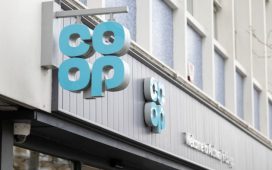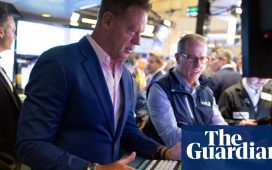Tesco says food inflation has dropped in the past six months and will continue falling, with the grocer cutting prices on 2,500 products, including bread and broccoli, by an average of 12%.
Its chief executive, Ken Murphy, said customers were becoming more optimistic about the future, with worries over mortgage rates and grocery bills starting to ease. “I’m sure that it will be still challenging for a number of families. But overall, we think the customer is in good shape for this Christmas.”
Revealing a 14% rise in adjusted operating profit, the supermarket said it had reduced its prices on pasta, oil, and dairy products such as cheese, milk and yoghurt over the summer. However, some products are still going up in price, such as chicken, other meat and potatoes.
“We’ve seen inflation come down progressively over the last six months, which gives you a clear indication that our suppliers are working closely with us to try to drive down costs,” Murphy said. “And where you’re seeing some of the more extreme cost increases over the last 18 months, we’re starting to see costs come down.”
The results come a day after the British Retail Consortium revealed that food prices dropped in the UK in September for the first month in almost two years, raising hopes that a peak had been reached in soaring grocery price inflation.
Supermarket price wars helped grocery inflation fall, analysts said. However, food prices are still 9.9% higher than a year ago as the price of many kitchen staples continues to rise.
Murphy warned that some factors driving food price inflation were here to stay, such as higher wages and oil prices, and that shoppers were unlikely to see deflation driven by globalisation as in the past.
“Some of the inflationary pressures we’re seeing are more structural than temporary, and a lot of a lot of what drove deflation historically was globalisation. Of course, that’s something that’s reversing as we speak.”
People were still spreading the cost of Christmas over a longer period, he said, buying frozen food months in advance, a trend that had been in place for the last couple of years.
“Our sense is that our customers are broadly a little more optimistic than they were this time last year. And we’re seeing that in the general sentiment numbers. People are determined to enjoy Christmas.”
Asked about the impact of the scrapping of the Manchester leg of the HS2 rail project, expected to be announced by the prime minister on Wednesday, Murphy declined to comment directly but said: “As a national retailer with extensive coverage across the whole country, we would love to see the government really working on levelling up and making the whole country prosperous.”
after newsletter promotion
The retailer said it had introduced more affordable own-brand products in its smaller city centre Express stores, which are up to 40% cheaper than the items they replaced.
The supermarket also reported strong growth in its upmarket Finest range, with shoppers treating themselves at home and dining in more at the weekend. It launched more than 150 new Finest products, and said it had won customers from premium retailers, such as Waitrose.
Murphy said Tesco’s price gap in comparison with the German discounters Aldi and Lidl had halved over the past three years. He added that there had also been an increase in theft and attacks on staff over the half year.
The retailer made an adjusted operating profit of £1.5bn in the first half of the year, up 14% from a year earlier. Pre-tax profit jumped to £1.2bn from £396m because of a £626m impairment charge last year.










